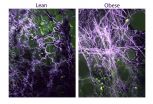The test can uncover small numbers of residual cancer cells that have resisted therapy by detecting cancer DNA in the bloodstream.
Researchers at The Institute of Cancer Research, London, and The Royal Marsden NHS Foundation Trust were able to track key mutations that cancer accumulates as it develops and spreads, without the need for invasive biopsy procedures.
They hope that by deciphering the DNA code found in blood samples, it should be possible to identify the particularly mutations likely to prove lethal to that patient - and tailor treatment accordingly.
The study, published in the journal Science Translational Medicine, is an important step towards use of 'liquid biopsies' to revolutionise breast cancer care - by changing the way cancer is monitored in the clinic and informing treatment decisions.
The research received funding from a number of organisations including the NIHR Biomedical Research Centre at The Royal Marsden and The Institute of Cancer Research (ICR), Breast Cancer Now and Cancer Research UK.
Researchers took tumour and blood samples from 55 breast cancer patients with early-stage disease who had received chemotherapy followed by surgery, and who had potentially been cured of their disease.
By monitoring patients with blood tests taken after surgery and then every six months in follow-up, the researchers were able to predict very accurately who would suffer a relapse.
Women who tested positive for circulating tumour DNA were at 12 times the risk of relapse of those who tested negative, and the return of their cancer was detected an average of 7.9 months before any visible signs emerged.
The researchers used a technique called 'mutation tracking' - developing a digital PCR test that was personalised to the mutations found in an individual patient's cancer - to identify tumour DNA in the bloodstream.
Because the researchers at the ICR and The Royal Marsden were looking for mutations common to many types of breast cancers, they found the test could be applied to all breast cancer subtypes.
The research also showed how genetic mutations build up in the cancer as it develops over time, as the leftover cancer cells grow and spread.
This reinforces the importance of detecting recurrence early so patients can have treatment before the extra mutations emerge and make the disease harder to treat.
Study leader Dr Nicholas Turner, Team Leader in Molecular Oncology at The Institute of Cancer Research, London, and Consultant Medical Oncologist at The Royal Marsden NHS Foundation Trust, said:
"We have shown how a simple blood test has the potential to accurately predict which patients will relapse from breast cancer, much earlier than we can currently. We also used blood tests to build a picture of how the cancer was evolving over time, and this information could be invaluable to help doctors select the correct drugs to treat the cancer."
"Ours in the first study to show that these blood tests could be used to predict relapse. It will be some years before the test could potentially be available in hospitals, but we hope to bring this date closer by conducting much larger clinical trials starting next year. There are still challenges in implementing this technology, but digital PCR is relatively cost-effective and the information that it provides could make a real difference to breast cancer patients."
Professor Paul Workman, Chief Executive of The Institute of Cancer Research, London, said:
"We are moving into an era of personalised medicine for cancer patients. This test could help us stay a step ahead of cancer by monitoring the way it is changing and picking treatments that exploit the weakness of the particular tumour. It is really fantastic that we can get such a comprehensive insight about what is going on in the cancer all over the body, without the need for invasive biopsies.
"Studies like this also give us a better understanding of how cancer changes to evade treatments - knowledge we can use when we are designing the new cancer drugs of the future."
INFORMATION:
Notes to editors
For more information contact Henry French on 020 7153 5380 or henry.french@icr.ac.uk. For enquiries out of hours, please call 07595 963 613.
The Institute of Cancer Research, London, is one of the world's most influential cancer research institutes.
Scientists and clinicians at The Institute of Cancer Research (ICR) are working every day to make a real impact on cancer patients' lives. Through its unique partnership with The Royal Marsden NHS Foundation Trust and 'bench-to-bedside' approach, the ICR is able to create and deliver results in a way that other institutions cannot. Together the two organisations are rated in the top four cancer centres globally.
The ICR has an outstanding record of achievement dating back more than 100 years. It provided the first convincing evidence that DNA damage is the basic cause of cancer, laying the foundation for the now universally accepted idea that cancer is a genetic disease. Today it leads the world at isolating cancer-related genes and discovering new targeted drugs for personalised cancer treatment.
As a college of the University of London, the ICR provides postgraduate higher education of international distinction. It has charitable status and relies on support from partner organisations, charities and the general public.
The ICR's mission is to make the discoveries that defeat cancer. For more information visit http://www.icr.ac.uk
The Royal Marsden NHS Foundation Trust
The Royal Marsden opened its doors in 1851 as the world's first hospital dedicated to cancer diagnosis, treatment, research and education.
Today, together with its academic partner, The Institute of Cancer Research (ICR), it is the largest and most comprehensive cancer centre in Europe treating over 50,000 NHS and private patients every year. It is a centre of excellence with an international reputation for groundbreaking research and pioneering the very latest in cancer treatments and technologies.
The Royal Marsden, with the ICR, is the only National Institute for Health Research Biomedical Research Centre for Cancer. First awarded the status in 2006, it was re-awarded in 2011. A total of £62 million is being provided over five years, to support pioneering research work, and is being shared out over eight different cancer themes.
The Royal Marsden also provides community services in the London boroughs of Sutton and Merton and in June 2010, along with the ICR, the Trust launched a new academic partnership with Mount Vernon Cancer Centre in Middlesex.
Since 2004, the hospital's charity, The Royal Marsden Cancer Charity, has helped raise over £100 million to build theatres, diagnostic centres, and drug development units.
Prince William became President of The Royal Marsden in 2007, following a long royal connection with the hospital.

